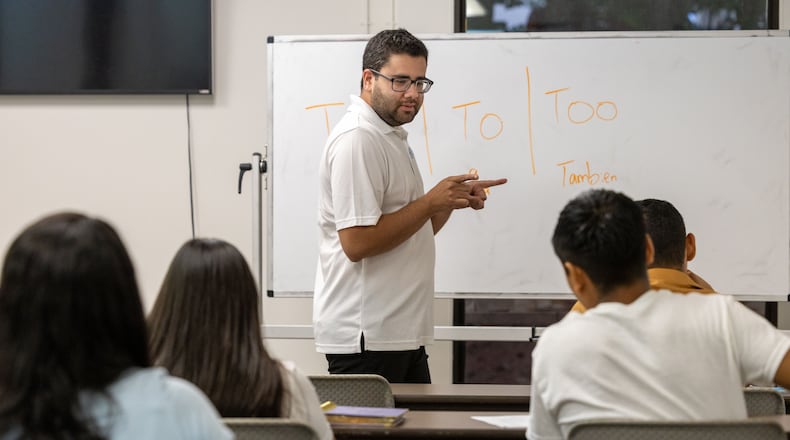Miguel Hernández knows what it’s like to move to a new country and be unfamiliar with the language.
The native Venezuelan couldn’t speak English when he immigrated to the United States three years ago. But because he arrived with a Fulbright Scholarship, he was given the language lessons needed to thrive.
Credit: Phil Skinner
Credit: Phil Skinner
After finishing a master’s degree in communications from Georgia State University, Hernández decided to delay further studies to help other Latino immigrants. He started a language school for Spanish speakers who want to learn English after work.
“I am an immigrant, but I have had amazing opportunities and support,” the 32-year-old Hernández said. “Not every immigrant has these same opportunities.”
The Instituto de las Americas opened in DeKalb County this year with about 40 students for classes at night and on weekend mornings to learn to speak, write, and read English.
The diverse student group — ages 20 to 45 — is primarily Mexican, but there also are adults from Guatemala, Venezuela, Colombia, El Salvador, and Honduras. Classes meet late during the week, from 8 p.m. to 10 p.m., and many students arrive wearing their work clothes.
“Believe it or not, studying English in the U.S. is a bit complicated, especially if you are not legal,” Hernández said. “At the same time, if you don’t speak English in the U.S., it’s complicated to get a job or to make friends. English is an everyday language.”
Students are grouped according to ability, with Hernández teaching the intermediate level and his college friend, Sam McVay, handling advanced lessons. Beginner classes are also offered.
Starting the school has been an outflow of Hernández’s earlier career. As a journalist in Venezuela, he taught communications workshops and trained thousands in marketing. Later, he moved to Peru to escape the unrest in his country and started several nonprofits to help Venezuelans. All of his family still live in Venezuela.
Hernández also recently started a nonprofit to expand internet connectivity to underserved communities in the U.S. and abroad. The Global Connection Project is dedicated to closing the digital divide, provide devices and promote tech literacy.
“I really like the idea of empowering people, supporting people,” Hernández said. “We really want to empower the Latin community. Of course, language is first, but at the same time, we want them to succeed in the U.S.”
Amidst the reading and writing classes, theschool is also a center where students can get help and advice. Future workshops will include topics like American history, leadership, customer service and social media.
Hernández and McVay have taken students to help them purchase cars and helped students start their own company.
They arranged a class day trip to Helen earlier this year. Most students had never been to northeast Georgia, and this was their opportunity to experience another part of the state, have fun, and enjoy friendships.
“We tell them this is a safe space, you can come in here and learn the language, and whatever you want to do – get a job, take the steps to become a citizen, anything – first you need to learn the language,” McVay said.
About the Author


